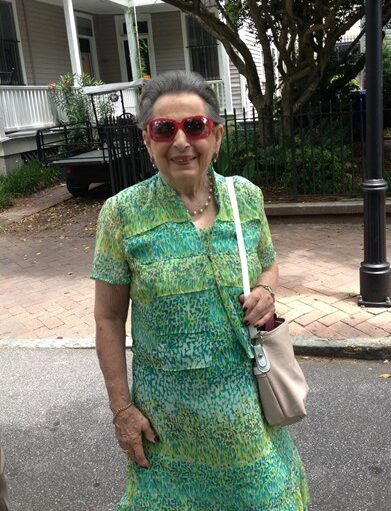About the LiBBY Study
The LiBBY Study seeks to determine if THC and CBD are safe and effective for management of agitation at the end-of-life for people with dementia.
“This study is not only about science. It is a work of love.”
– Jacobo Mintzer, MD, MBA, Study Co-Principal Investigator
LiBBY is not just the name of this study, but also a way to pay tribute.
Similar to the experience of many, Libby Soffar got to the final stages of her life and needed the support of hospice care. Faced with tough decisions about her care and treatment, her loved ones unfortunately encountered limited options. With the LiBBY Study, we hope for that to change.

Click on the video to hear the rest of Libby Soffar’s story
“I think we accessed the best we could and we made choices on [Libby’s] behalf that we felt were hard choices, and good for her but I don’t think any of us felt satisfied with what was available to us.”
Cindy Allen, Libby Soffar’s Daughter
"This study can make a difference. This study is so important."
Ellen Steinberg, Libby Soffar’s Daughter
The LiBBY Study is the first of its kind to:
Focus on improving the quality of end-of-life stages for people with agitation and dementia.
Examine the ability of THC and CBD to decrease agitation in patients with dementia who are eligible for hospice care.
Study Overview
LiBBY is a research study, funded by the National Institute on Aging (NIA) of the National Institutes of Health (NIH), investigating the possible benefits of an oral combination of Delta-9-tetrahydrocannabinol (THC) and cannabidiol (CBD) in reducing agitation in people who are hospice eligible with Alzheimer’s disease (AD) or other types of dementia.
Over the course of 12 weeks, study participants will receive a THC/CBD oral combination versus placebo in the form of a digestible oil.
Depending on where a participant resides, in-person visits may take place at a participant’s home or at a facility. Telephone appointments will be scheduled in between in-person visits.
This study is placebo-controlled and double-blinded. What does that mean?
To participate, individuals must be eligible for hospice care, have a diagnosis of any type of dementia, show symptoms of agitation, be at least 40 years of age, and have a study partner.
Study Leadership
The LiBBY Study is funded by the National Institute on Aging (NIA) of the National Institutes of Health (NIH) and is being conducted by the NIH-funded Alzheimer’s Clinical Trials Consortium (ACTC), a network of leading academic Alzheimer’s research centers.
The study is led by Alzheimer’s disease research experts and academic leadership at the University of Southern California’s Alzheimer’s Therapeutic Research Institute, Medical University of South Carolina, and Georgetown University.
The researchers leading the design and implementation of the study are:

Jacobo Mintzer
M.D., M.B.A.
Professor, College of Health Professions, Medical University of South Carolina
Staff Physician, Ralph H. Johnson Veterans Affairs Health Care System

Brigid Reynolds
MSN, ANP-BC
Clinic Coordinator and Clinical Trial Nurse Practitioner of the Memory Disorders Program at Georgetown University Medical Center

Paul Aisen
M.D.
Director, Alzheimer’s Therapeutic Research Institute at the Keck School of Medicine of the University of Southern California
Study Locations
The LiBBY Study has several locations across the United States.
